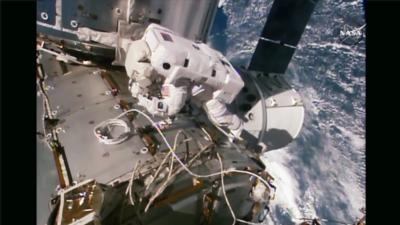Thu, Jun 27, 2024
The Old EVA Units Hold the Line 45 Years After They Were Designed - But Time's Running Out
Apparently the old NASA set the bar pretty high, now that rumors hint that RTX Collins Aerospace wants out of its contract to design them for the Artemis mission.

Reporters said that the RTX firm was in talks with NASA about dropping the contract, leaving NASA stuck with its now quite vintage Extravehicular Mobility Units spacesuits. That's bad news for the administration, since the 48-year-old equipment is a critical element in pulling off maintenance operations in orbit. The contract walkback comes at a bad time, too, with highly visible suit failures occupying the public eye. In recent weeks, NASA had to cancel a scheduled spacewalk twice, the first time citing discomfort issues, and the rescheduled walk canceled only a few minutes into its quarter-day runtime. The spacewalk ended just as quickly as it began when astronaut Tracy Dyson's suit sprung a leak, occluding the visor. That's not the first time, either. The space suits have been such a running issue that NASA's independent Aerospace Safety Advisory Panel has made it a tradition to call for their upgrade. But, development is evidently tougher than it was fifty years ago.

The contract saw $3.5 billion awarded to Collins and Axiom Space in 2022, intending to provide new space suits for extravehicular activity on the International Space Station and future lunar landings. Collings reportedly got almost $100 million of that chunk, specifically earmarked for ISS suit engineering. If they needed additional funding, they were to get extra portions from Axiom as work demanded. But one delay after another has put the contract on the backburner, leaving Collins wanting to "descope" its tasking of the Exploration Extravehicular Activity Services (xEVAS) contract. That will leave NASA in the lurch as it looks to assign Collins' work to someone else.

Axiom's efforts to make a more robust type of spacesuit fit for dusty lunar adventures may not be going so great either. Originally, the first flight-ready new xEMUs were to be ready by November 2024, but the usual delays through 2019 and beyond left the program all over the map. That's not all that surprising, since the suits were expected to be a part of a program to establish lunar landings by 2024. Across the board, things have gotten messy, as evidenced by a biting audit published in 2021. The Government Accountability Office dug deep into NASA's space suit approach, and criticized it for attempting to fund and procure two distinct, separate, and non-interchangeable space suit designs, noting that NASA had sunk more than a billion dollars into getting a next-gen suit for nothing but some non-functional window dressing. When all's said and done, today's program should have at least had two flight-ready suits, and an ISS demo suit.
More News
"The owners envisioned something modern and distinctive, yet deeply meaningful. We collaborated closely to refine the flag design so it complemented the aircraft’s contours w>[...]
Nonradar Arrival An aircraft arriving at an airport without radar service or at an airport served by a radar facility and radar contact has not been established or has been termina>[...]
From 2022 (YouTube Edition): Still Life with Verve David Uhl was born into a family of engineers and artists—a backdrop conducive to his gleaning a keen appreciation for the >[...]
Also: Electra Goes Military, Miami Air Taxi, Hypersonics Lab, MagniX HeliStrom Amazon’s Prime Air drones are back in the spotlight after one of its newest MK30 delivery drone>[...]
Also: Trailblazing Aviator Betty Stewart, Wind Farm Scrutiny, Chatham Ban Overturned, Airbus Shares Dive A Thunderbird pilot, ID'ed alternately as Thunderbird 5 or Thunderbird 6, (>[...]
 Aero-News: Quote of the Day (12.11.25)
Aero-News: Quote of the Day (12.11.25) ANN's Daily Aero-Term (12.11.25): Nonradar Arrival
ANN's Daily Aero-Term (12.11.25): Nonradar Arrival Classic Aero-TV: David Uhl and the Lofty Art of Aircraft Portraiture
Classic Aero-TV: David Uhl and the Lofty Art of Aircraft Portraiture Airborne-NextGen 12.09.25: Amazon Crash, China Rocket Accident, UAV Black Hawk
Airborne-NextGen 12.09.25: Amazon Crash, China Rocket Accident, UAV Black Hawk Airborne 12.05.25: Thunderbird Ejects, Lost Air india 737, Dynon Update
Airborne 12.05.25: Thunderbird Ejects, Lost Air india 737, Dynon Update





